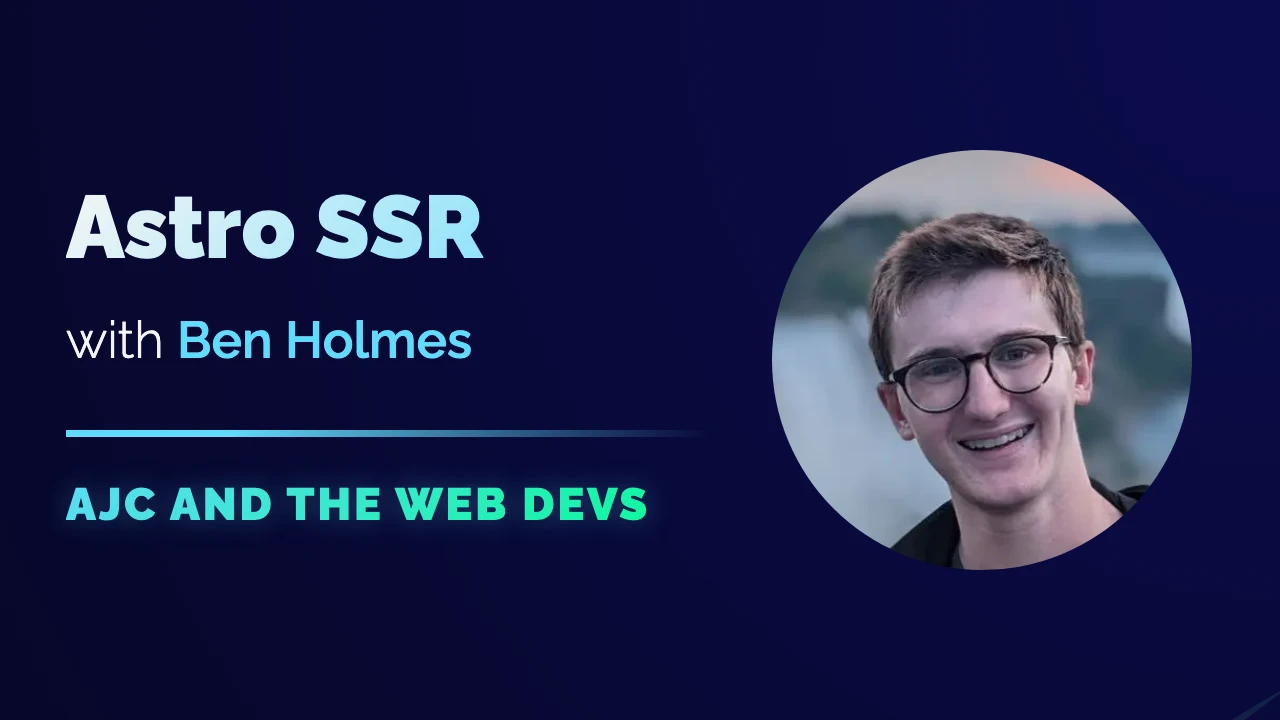Anthony Campolo and Ben Holmes discuss Astro SSR capabilities, covering cache control options, deployment platforms, and community collaboration.
Episode Summary
In this episode, Anthony Campolo and Ben Holmes dive deep into Astro’s server-side rendering (SSR) capabilities. They explore the advantages of using SSR with Astro, discussing its flexibility in handling dynamic routes and data fetching. The conversation covers various deployment platforms, focusing on Netlify and Vercel, and how they interact with Astro’s SSR features. They demonstrate practical implementation of cache control headers and compare the behavior on different platforms. Throughout the episode, they highlight Astro’s simplicity and ease of use, while also touching on broader web development topics like the Jamstack architecture and the evolving landscape of web frameworks. The discussion is interspersed with community engagement, addressing questions and comments from viewers in real-time.
Chapters
00:00 - Introduction and Framework Discussion
Ben Holmes introduces himself and his work with Astro. The conversation begins with a discussion about various web development frameworks and their approaches to server-side rendering (SSR). They touch on the differences between Next.js, Remix, and Astro in handling SSR and static site generation. The hosts also briefly mention the concept of Jamstack and how different frameworks fit into this architecture. This chapter sets the stage for the more in-depth technical discussion to follow, providing context on the current state of web development frameworks.
06:52 - Deep Dive into Next.js 13 and React Server Components
The hosts discuss the recent release of Next.js 13 and its implementation of React Server Components. They explore how Next.js 13 has shifted towards a more server-centric approach, automatically determining whether to use static generation or server-side rendering based on the code written. The conversation covers the implications of this approach for developers, including potential challenges with understanding deployment behavior. They also touch on the broader impact of React Server Components on the React ecosystem and how other frameworks like Remix and Gatsby are responding to these changes.
35:03 - Introduction to Astro SSR
Ben Holmes introduces Astro’s approach to server-side rendering. He explains how Astro SSR differs from other frameworks, emphasizing its flexibility and ease of use. The discussion covers how Astro treats each route as an endpoint, allowing developers to return HTML, data, or even implement redirects easily. They explore use cases for Astro SSR, such as creating dynamic routes for blogs or implementing custom redirects. This chapter provides a comprehensive overview of Astro’s SSR capabilities and sets the stage for the practical demonstration that follows.
54:52 - Practical Demonstration of Astro SSR and Caching
The hosts begin a hands-on demonstration of implementing Astro SSR with caching. They walk through the process of adding cache control headers to an Astro project, explaining the significance of different caching options. The demonstration covers deploying to different platforms (Netlify and Vercel) and troubleshooting issues related to edge functions and caching behavior. This practical section illustrates the real-world application of Astro SSR and highlights the importance of understanding platform-specific behaviors when implementing caching strategies.
74:41 - Community Q&A and Closing Thoughts
The final segment of the episode is dedicated to answering questions from the live audience. Topics include Astro’s compatibility with various deployment platforms, the flexibility of Astro’s integration system, and the future of web development trends. Ben Holmes provides insights into Astro’s development philosophy and invites community contributions. The hosts also touch on lighter topics, including jokes about framework competitions and web development trends. The episode concludes with final thoughts on Astro’s place in the web development ecosystem and encouragement for viewers to explore and contribute to the framework.
